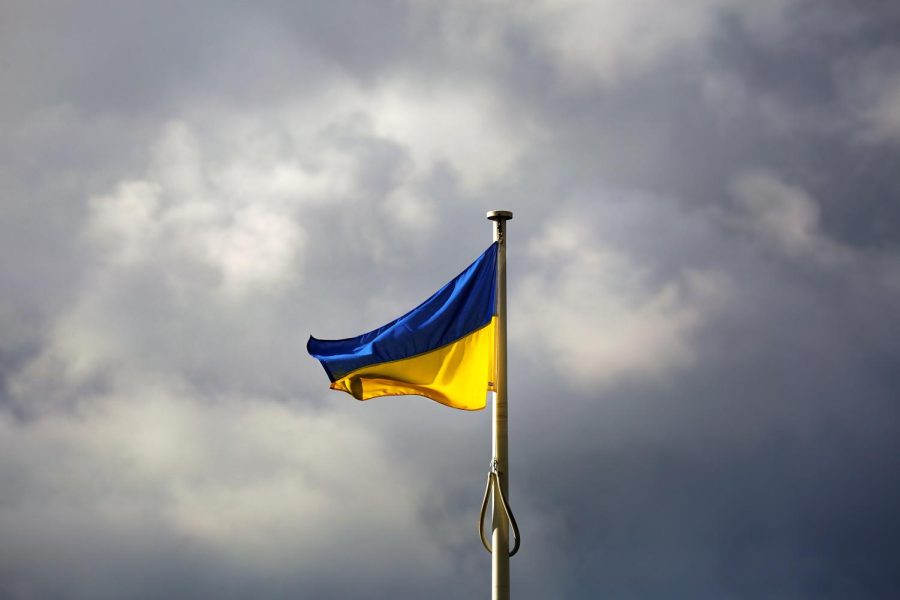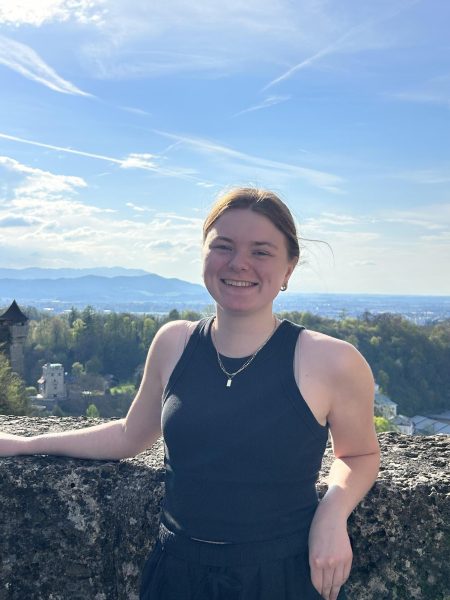Humanitarian workers from Ukraine speak to Macalester
April 28, 2022
On Tuesday, April 26, the Russian studies department and Mac4Ukraine hosted a conversation with Alexandra Sakurets, a Ukraine-born Minneapolis resident and a registered nurse, and Maryana Semeniuk, a Ukrainian refugee and humanitarian worker who escaped Ukraine and is currently living in the Twin Cities with her sister. Both Sakurets and Semeniuk have recently returned from working on the border of Ukraine and Poland and shared their experience and stories with the Macalester community.
After the Russian studies department and Mac4Ukraine’s multiple events spreading awareness and helping students understand the conflict, this event shifted in tone to give personal accounts of the conflict’s horrors. Sakurets, the first person to speak, had lived in the U.S. since she was 12, and said she felt called to help when the war broke out.
“There are some things you do because they are logical and they make sense and there are some things you do … because your inner voice says to,” Sakurets said.
Sakurets explained that she was a refugee in 1989 and remembered all those smiling humanitarian aid workers that helped her during that time, saying that she wanted to be that smiling face for Ukrainians entering Poland.
Sakurets then found a Facebook group of people that were going to Ukraine and they got funds from trusted nonprofits to cover their expenses. When she arrived in Poland, she and her group found a border crossing that needed help. They set up in an abandoned shopping center that had been converted into a crisis center for refugees.
In the center, refugees would arrive at all times of the day needing basics such as food, water, warm clothes, suitcases and a place to sleep. Sakurets and other volunteers checked refugees in and navigated the logistics of getting them to a safe country that could accommodate them.
Sakurets emphasized how logistically challenging the whole situation is. For example, many Ukrainians did not have passports as they never expected to leave Ukraine, however now they are being forced to leave and move to countries all over Europe — such as Germany, France, Italy and Denmark — and are not allowed to enter. Another large problem was that some people refused to be separated from their pets, as for some that was their only family. Even if they received entry and a place to stay in another country, their pets did not, so they refused to go.
Issues also revolved around SIM cards; Ukranians did not have SIM cards that would work outside of Ukraine and Poland and would thus lose contact with their families and refugee aid workers once they left. Navigating human trafficking was an additional point of concern, as thousands of women and children without direction led to safety concerns around the border.
The largest issue, though, was that most refugees simply did want to go any further than Poland. Almost all the refugees were women with children and the elderly, and they wanted to remain as close to Ukraine, as close to their house and as close to their husbands as possible, since men between 18 and 60 years old are required to stay in the country and fight. These mothers are in charge of generations of their families and are overwhelmed by their situation.
However, staying in Poland is not an option as it is overcrowded with refugees. Sakurets described the crisis center in which she volunteered, where there were 2,500 people with just two indoor bathrooms.
“The reality is they can’t stay … immediately we had GI [gastrointestinal] issues and no real way to isolate anyone,” Sakurets said. “[There was] lots of COVID, no one wore masks [and there were] people sleeping immediately right next to each other.”
The unsafe conditions in these centers forced people out and into foreign countries where their futures were unclear. Sakurets described the fear these mothers had and how it differed from their children’s innocent perspective in this situation.
“You can’t go home, you’re a woman.” Sakurets said, “your husband is out fighting. Maybe the best thing to do is have a beautiful spring for your children and yourself and share them with your spouse with kind words. And if he knows you’re okay maybe he will fight better maybe he will be in a better mood. It’s about energy.
However, according to Sakurets, the refugees found it difficult to believe this. “They couldn’t even think that.” Sakurets said “That was like me explaining how they are going to fly to the moon. It was so far from their reality.”
As a registered nurse, Sakurets aided medically in whatever ways she could with the supplies she brought from home. She explained that she and her team did not see war injuries. Instead, they aided in managing illnesses that developed within the crisis centers, as well as chronic illnesses like diabetes that were not tended to for multiple weeks when the refugees were staying in bomb shelters.
Next, Semeniuk, who has lived in Ukraine for her whole life and escaped weeks after the invasion started, spoke. She left behind her husband who could not cross and remains in Ukraine to this day.
Semeniuk described hearing the bombs for the first time.
“When the war started the first day I heard the sounds of airplanes at night [and] … I was very scared and in panic and didn’t know what to do,” Semeniuk said.
After two more days of waiting, Semeniuk decided to leave her house and husband and go to Poland. Semuniuk described the struggles of getting on a train and how she only brought a small bag with her documents and struggled to get into Poland.
“I went to the border of Poland and there were thousands of people crossing the border, ” Semuniuk said. “And I even thought that I would die in that crowd because there was no air to breathe. Some people were fighting because there was panic. I was crossing for eight hours in that crowd.”
Once she got into Poland and got aid from workers, she eventually moved in with her friends in Warsaw. However, this place was overcrowded and filled with other refugees. Eventually, she made it to another friend’s house in Warsaw and, like Sakurets, was also called to help people on the border.
Semuniuk worked with the Christian church she is affiliated with in Poland, as well as back in Ukraine, to aid people in any way she could. She helped them to find housing and to provide spiritual and moral aid.
Semuniuk brought her guitar and played for the group a rendition of a Ukrainian Christian song that she sang to refugees to cheer them up. These stirred many emotions and there were some teary eyes.
After working on the border for three weeks, Sakurets finally booked a plane ticket to the U.S. and came to live with her sister in Minneapolis.
The organizer and moderator of the event, Russian studies lab instructor Tamara von Schmidt-Pauli, spoke about the power this event can have on its attendees in humanizing the conflict and bringing this conflict “home.”
“Sometimes you can think we’re so far away from the conflict … and it’s not here … here we have plenty of people that are refugees,” Schmidt- Pauli said. “We are all here and we can do something to help.”
Semeniuk also referred to students studying Russian, reminding them to not cast all Russians aside.
“You are in a unique situation of studying Russian,” Sakurets said. “I love speaking Russian, I like Russian culture, I like Russian food …The one thing I don’t like is Russian politics. Politics change. This will pass. I hope this is a dark chapter in the Russian federation history.”
Schmidt-Pauli ended with a word of hope, praying for the war to end and for aid to continue.
“Let’s stay human and let’s keep helping each other on a personal level,” Schmidt-Pauli said.













